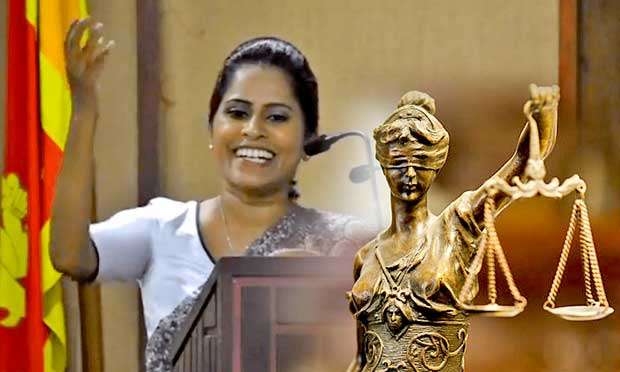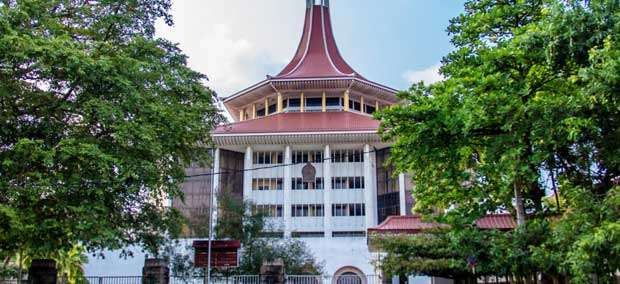Reply To:
Name - Reply Comment
Last Updated : 2024-04-27 08:30:00

The critical comments made by the Attorney-at-Law Suganthika Fernando on the conduct of a judicial officer and the happenings at Marawila Magistrate’s Court should prompt us to take a realistic and dispassionate look at the whole judicial process of this country. Her allegations which are of serious nature would have tremendous negative impact on the image of the whole judicial system. Therefore in fairness to all those who are involved in the judicial process without rejecting her allegations outright, I would urge that a fair and impartial inquiry be held to determine the truthfulness or otherwise of the allegations made.
In any realistic appraisal of the judicial system, we cannot overlook its shortcomings and weaknesses. Therefore in the light of the critical comments made by her, the following considerations are clearly warranted. 
Today, we live in an age when all our traditional institutions are under close scrutiny and attack. In an age when our traditional institutions are under close surveillance by the media and the members of the public, only a rational and dispassionate appreciation of how our judicial system works can protect its integrity and survival of the system which we have nurtured and developed over several centuries.
It must be admitted that the Judges today unlike in the past, live and work in full glare of publicity and is no longer immune from constructive and reasonable criticism by the members of public and media. As any other institution, the judicial institution and the men who work it are critically watched, observed and assailed by the members of the public and the media. Their decisions and judgements are subject to scrutiny, analysis and evaluation by them. Therefore, it is of paramount importance that nothing should be done to diminish the prestige of the judicial system.
It cannot be said that criticism levelled against some aspects of the judicial system are unjustified, as Judges are not infallible and they are not beyond reproach. It is said that justice is not cloistered virtue and she must be allowed to suffer the scrutiny and outspoken comments of the ordinary men who are interested in the system. (Lord Atkin in Ambard vs. Attorney General of Trinidad and Tobago 1936 AC 322 at 335).
The Judges today unlike in the past, live and work in full glare of publicity
Criticism levelled against some aspects of the judicial system are unjustified
This country is still blessed with distinguished tradition of judicial independence and excellence and our judicial system has inbuilt qualities of objectivity, independence and impartiality. If the public is to retain their confidence in the judicial process, nothing should be done to undermine its credibility.
The confidence placed by the public in the judicial system and its process is the most precious asset. The forfeiture of that confidence will inevitably lead to the end of the ordered society.
It is in the lower courts that the citizens most often have contacts with the judiciary. From the moment an accused is presented to court by the police, until final determination of the case the accused faces the Judge whenever decisions affecting his life and future are made.
It is there that the public form their first impression of the whole judicial process. Public impression of the whole system is moulded and shaped to a great extent by the conduct and the demeanour of the Judge. Lord Denning observed “When a Judge sits to try a case, he himself on trial before his fellow men,” Therefore it is on his conduct and behaviour that they will form their own opinion about the system of justice prevailing in the country. It is the Judge who must bring honour to the seat of justice. The quality of justice depends greatly on the quality of those who dispense it. As the American Jurist Benjamin Cardozo once observed “in the long run, there is no guarantee of justice except the personality of the Judge”.
When the workings of the Magistrates Courts are examined it would be evident that there are extreme variations and differences between their own practices and that of others. There are in fact considerable variations in the way different magistrates use their authority and powers.
The quality of justice depends greatly on the quality of those who dispense it
Judges should display some degree of rationality and coherence in the orders they make
Even within the same court vast disparities and differences are seen in such matters as sentencing and approach to bail applications. People assume that the law is something that is clear cut and the remedies applicable to violations are clearly laid down. When we really look at the workings of Magistrate courts it becomes clear to us that this assumption that the law in a given situation is clearly laid down is completely erroneous and misconceived. For some judges most of the law is a matter of discretion and discretion is whatever they think is right. Even authoritative decisions handed down by some of our eminent judges of the superior courts are of little relevance to them. Substantive and procedural law are also of little significance to them.
In this connection, I am reminded of the great American legal realist Karl Llewellyn who observed in his writings “the theory that rules decide cases seems for centuries to have fooled not only library ridden recluses, but Judges”. He believed that the focal point of legal research should be shifted from the study of rules to the observances of real behaviour of law officials particularly of Judges.
Jerome Frank another radical realist in his writings argued that judicial decisions are conditioned by emotion prejudices, tempers and other irrational factors and the knowledge of substantive and prescriptive law would be of little help in predicting the decision of a particular Judge. He further observed “no one knows the law about any case with respect to any given situation, transaction or event until there has been a specific decision with regard thereto”. For him what the Judges do in court is the law. Therefore it is evident that the assumption that the law is something that is clearly laid down and remedies applicable in a given situation in belied by their own conduct and practices. It is true that comparisons of cases and offences may be difficult as facts in one may be dissimilar to another case. Disparities and lack of uniformity in the orders made by Judges can be justified as long they are within the parameters of the law and based on strictly legal criteria. But it is important that Judges should display some degree of rationality and coherence in the orders they make.
As far as the bail system in many magistrate courts is concerned it should be stated that it is far from the ideal. Purpose of bail is to ensure the presence of suspect in court to answer the charges and submit to trial. In matters concerning bail Criminal Procedure Code and other laws relating to bail now govern what should be done to a suspect awaiting trial in court.

Despite the general rule which strongly favours pre-trial release pending trial setting unattainable and excessive bail which suspects cannot afford even in circumstances where they could be released on their own recognizance is an abusive judicial practice some Judges resort to in order to make them plead guilty to charges which sometimes they did not commit. Although a great weight is traditionally attached to the fundamental principle of the presumption of innocence some Judges often seem to be guided and influenced by the “principle of guilt” in the process of making orders from the time a suspect is presented to court. For them what the police say is the gospel truth.
Corruption and perception of corruption in court is also an enduring problem. It is pervasive and none can deny that corruption and other irregular practices exist in the field of office administration in courts. It must be remembered that judges’ functions are not primarily concerned with presiding over courts but their work extends to other parts of judicial process such as administration of the office work. Therefore, it is their responsibility to see that corruption and other irregular practices are completely eliminated or at least minimised in their courts.as it leads to the erosion of the public confidence of the whole judicial process.
Criticisms have also been levelled against certain Judges for the use of inelegant inappropriate and abrasive language in the course of judicial proceedings. Judges should treat all parties equally with utmost courtesy and they should be restrained in their speech when addressing lawyers and other litigants before them. It has to be remembered that use of unrestrained language by a Judge in judicial proceedings tends to diminish fairness and effectiveness of judicial process. In the course of judicial proceedings, a Judge may honestly err which is pardonable, but he should not consciously and deliberately deviate from the correct path.
Finally, in regard to the critical comments made by the attorney, I must state I can neither discount nor accept what she uttered in regard to the conduct of the judicial officer or the alleged happenings at this particular court, as I was not an eye witness to the incident, which can only be proven at an impartial and fair inquiry.
My primary objective in writing this is neither to castigate the judiciary as a whole nor even to impugn the conduct of a particular Judge. I write this solely in the interest of an institution, which we have nurtured and preserved for generations.
BuffaloaCitizen Monday, 28 May 2018 11:22 AM
Super comment Justice Chandradasa, wish their were more of your mindset in this profession.
mugunthan Tuesday, 29 May 2018 02:58 PM
EXCELLENT WELL DONE JUSTICE CHANDRADASA, COUNTRY NEED PEOPLE LIKE YOU TO RULE ,

Add comment
Comments will be edited (grammar, spelling and slang) and authorized at the discretion of Daily Mirror online. The website also has the right not to publish selected comments.
Reply To:
Name - Reply Comment
US authorities are currently reviewing the manifest of every cargo aboard MV
On March 26, a couple arriving from Thailand was arrested with 88 live animal
According to villagers from Naula-Moragolla out of 105 families 80 can afford
Is the situation in Sri Lanka so grim that locals harbour hope that they coul

26 Apr 2024
26 Apr 2024